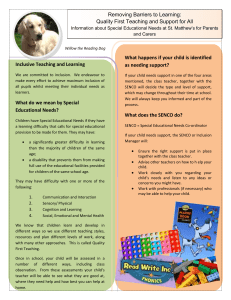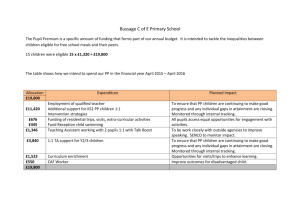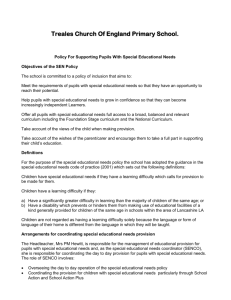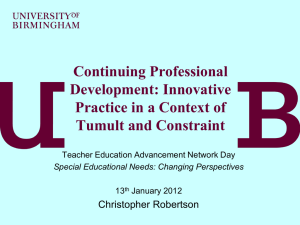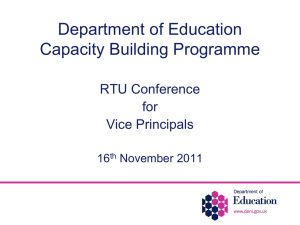Our Local Offer - Roose Community Primary School
advertisement
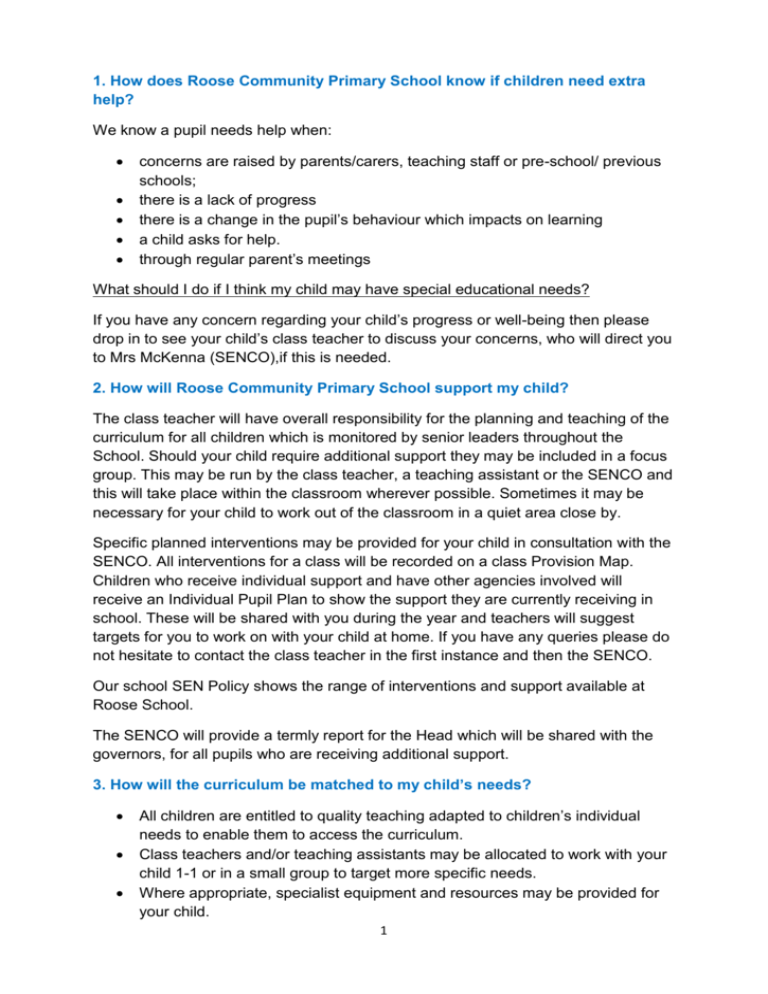
1. How does Roose Community Primary School know if children need extra help? We know a pupil needs help when: concerns are raised by parents/carers, teaching staff or pre-school/ previous schools; there is a lack of progress there is a change in the pupil’s behaviour which impacts on learning a child asks for help. through regular parent’s meetings What should I do if I think my child may have special educational needs? If you have any concern regarding your child’s progress or well-being then please drop in to see your child’s class teacher to discuss your concerns, who will direct you to Mrs McKenna (SENCO),if this is needed. 2. How will Roose Community Primary School support my child? The class teacher will have overall responsibility for the planning and teaching of the curriculum for all children which is monitored by senior leaders throughout the School. Should your child require additional support they may be included in a focus group. This may be run by the class teacher, a teaching assistant or the SENCO and this will take place within the classroom wherever possible. Sometimes it may be necessary for your child to work out of the classroom in a quiet area close by. Specific planned interventions may be provided for your child in consultation with the SENCO. All interventions for a class will be recorded on a class Provision Map. Children who receive individual support and have other agencies involved will receive an Individual Pupil Plan to show the support they are currently receiving in school. These will be shared with you during the year and teachers will suggest targets for you to work on with your child at home. If you have any queries please do not hesitate to contact the class teacher in the first instance and then the SENCO. Our school SEN Policy shows the range of interventions and support available at Roose School. The SENCO will provide a termly report for the Head which will be shared with the governors, for all pupils who are receiving additional support. 3. How will the curriculum be matched to my child’s needs? All children are entitled to quality teaching adapted to children’s individual needs to enable them to access the curriculum. Class teachers and/or teaching assistants may be allocated to work with your child 1-1 or in a small group to target more specific needs. Where appropriate, specialist equipment and resources may be provided for your child. 1 4. How will I know how my child is doing? Your child’s class teacher is available at the end of the day if you want to have an informal chat but if you require a more detailed conversation, please make an appointment with your child’s teacher or through the school office. You will be kept informed of your child’s progress through parent consultations which are usually held in the Autumn and Spring Terms. Parents can request an appointment with the SENCO at the school office. How will you help me to support my child’s learning? The class teacher may suggest ways of supporting your child‘s learning at home through discussion with parents or through suggested targets on your child’s Individual Pupil Plan. Mrs McKenna (SENCO) is happy to meet with you to discuss ways in which you can support your child at home. If external agencies have been involved, you will always be invited to a meeting with them to discuss school and parental concerns. 5. What support will there be for my child’s overall well-being? Our primary concern at Roose School is the well being of all our pupils. The School offers a variety of support for all pupils including those who may be experiencing emotional difficulties or medical needs. These may include: Opportunities for children to talk with members of staff such as Head Teacher, teachers, teaching assistants or midday supervisors if they have any concerns they wish to discuss. Support from external agencies may be provided if deemed appropriate. Children may be invited to be part of a nurture/social skills group aimed at supporting pupils with any social and emotional aspects of learning that they have and giving pupils the opportunity to discuss issues/concerns with a teaching assistant. Details of a child’s medical need(s) are kept on a class register and are shared with all staff. Photographs are displayed in the office and in the child’s classroom detailing their medical need. In some cases, a detailed health care plan will be drawn up in conjunction with the school nurse. 6. What specialist services & expertise can be accessed by the School? Agencies regularly accessed: EDUCATION Educational psychologist- An Educational Psychologist is allocated to each school. He/she will normally work directly with a child whose needs are felt to be quite considerable and has not responded well to the interventions previously put in place. 2 The Educational Psychologist attends school following referrals for individual children. The Psychologist will meet with the parent and give feedback after the assessment has been completed. He/she will offer advice to the School and parent/carer on how best to support their child to take their learning forward. Specialist Advisory Teachers – Early Years, Speech Language and Communication, Autistic Spectrum, Physical/Medical Difficulties, Hearing impaired, Visually impaired, English as an Additional Language, Achievement Teacher for Looked After Children HEALTH School Nurse Speech and Language Therapist Paediatrician Occupational Therapist Physiotherapist CHILDREN’S SERVICES Action for Children Parent Partnership Love Barrow Families Social Care 7. What training has been provided for supporting staff? All Staff receive access to regular training and updates related to special educational needs. Our SENCO is a qualified and experienced teacher. She has an Advanced Certificate in Specific Learning Difficulties and ATS with the British Dyslexia Association. She has been a leading SENCO in the county and has a special interest in the development of handwriting. 8. How will my child be included in activities outside the classroom? Risk assessments are carried out and procedures put in place to enable all children to participate. If a health and safety risk assessment suggests that an intensive level of 1-1 support is required, a parent or carer may also be asked to accompany their child during the activity in addition to the usual staff. 9. How accessible is the school environment? As a school we are happy to discuss individual access requirements and make reasonable adjustments to meet these needs. Facilities at present include:3 Ramps into school to make the building accessible to all. Children’s disabled toilet 10. How will my child be prepared and supported for transition to and from Roose Community Primary School? Roose School understands that moving school or provision can be quite a challenging time for some pupils and puts a number of strategies in place to make the transition as smooth as possible. These include: Meetings between pre-school settings and Roose School. Liaison with individual Children’s Services for pre-schoolers moving to Roose School. Early Years Teachers make visits to our pre-school feeders. Additional visits for pupils with Additional Educational Needs as well as the schools usual induction procedures A Transition Programme operates between Roose School and all receiving Secondary Schools. These may include tours for pupils, induction morning or afternoon sessions, transition books, tours for individual families, meetings with the receiving SENCO and staff visits 11. How are school resources allocated and matched to children’s SEN? Our finances are monitored and audited regularly. Specialist advice/support may be bought in to support individual children. Pupil premium is used to enhance the learning and teaching of those children who have been allocated this extra funding. 12. How is the decision made about how much support a child will receive? When children first join Roose School, additional support is allocated according to the information provided by the previous school for pupils with Additional Educational Needs. The class teacher will then carefully monitor progress and consult with the Headteacher at pupil progress meetings. During their school life, if further concerns are identified due to the pupil’s lack of progress or well-being, the class teacher, together with the SENCO, will adjust the level of support accordingly. This information will be shared with the parents. 13. How will I be involved in discussions and planning for my child? All parents are encouraged to contribute to their child’s education. This may be through: Discussion with the child’s class teacher. During parent consultations. 4 Through meeting with the SENCO or other professionals. 14. Who can I contact for further information? If you wish to discuss your child’s education further or are unhappy with something regarding your child’s schooling please contact, in the first instance your child’s class teacher. For pupils with Special Education Needs, further information and support can be obtained from the SENCO or the Headteacher. 5


